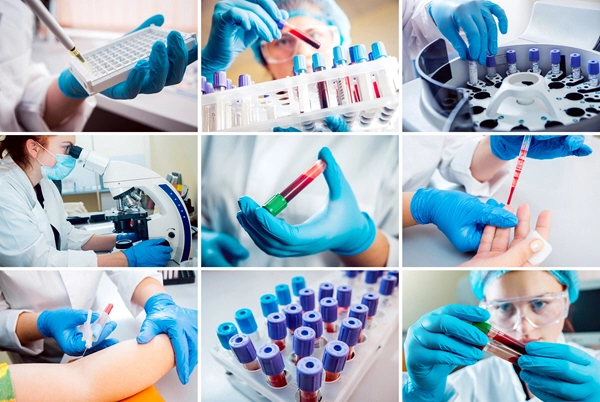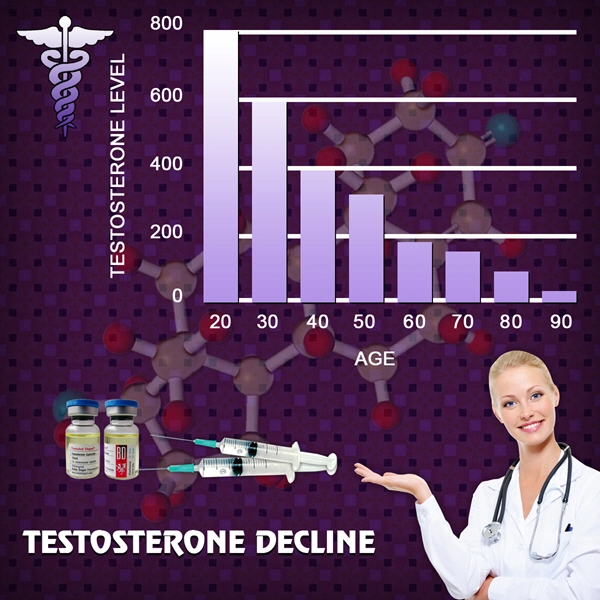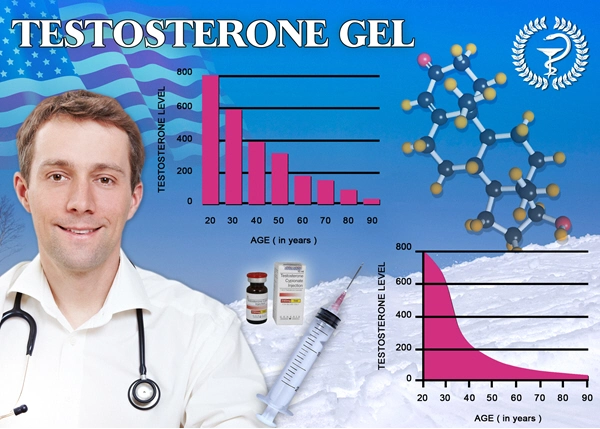Introduction
Testosterone deficiency syndrome (TDS), also known as hypogonadism, is a clinical condition characterized by low levels of testosterone in the bloodstream. This condition has been increasingly recognized as a significant health concern among American males, with implications that extend beyond traditional symptoms such as reduced libido and muscle mass. Recent studies suggest a potential link between testosterone levels and immune function, prompting further investigation into how TDS might influence the body's ability to combat infections and maintain overall health. This article delves into the immunological aspects of TDS, focusing on the effects observed in American males and the implications for clinical practice.
Understanding Testosterone Deficiency Syndrome
Testosterone deficiency syndrome is prevalent among American males, particularly as they age. It is estimated that up to 40% of men over the age of 45 may experience some degree of testosterone deficiency. The condition can result from various factors, including aging, obesity, chronic illnesses, and certain medications. Symptoms of TDS include fatigue, depression, decreased muscle strength, and reduced sexual function. However, the immunological effects of TDS are less commonly discussed, yet they are crucial for understanding the full scope of this condition.
The Role of Testosterone in Immune Function
Testosterone plays a multifaceted role in the immune system. It influences the production and activity of various immune cells, including T cells, B cells, and macrophages. Research indicates that testosterone can modulate the immune response by affecting cytokine production and the balance between pro-inflammatory and anti-inflammatory processes. In American males, maintaining optimal testosterone levels may be essential for a robust immune system capable of effectively responding to pathogens and maintaining homeostasis.
Immunological Markers and TDS
Several studies have explored the relationship between testosterone levels and immune markers in American males. One key finding is the association between low testosterone and increased levels of pro-inflammatory cytokines such as interleukin-6 (IL-6) and tumor necrosis factor-alpha (TNF-α). These cytokines are critical in the body's inflammatory response but can become detrimental when chronically elevated, leading to conditions like cardiovascular disease and diabetes, which are prevalent among American men.
Moreover, testosterone deficiency has been linked to alterations in T cell populations. Specifically, low testosterone levels are associated with a decrease in the number of regulatory T cells (Tregs), which are essential for suppressing autoimmune responses and maintaining immune tolerance. This reduction in Tregs may contribute to an increased risk of autoimmune diseases in men with TDS.
Clinical Implications for American Males
The immunological effects of TDS have significant implications for the health management of American males. Physicians should consider screening for testosterone deficiency in patients presenting with chronic inflammatory conditions or recurrent infections, as addressing TDS could potentially improve immune function and overall health outcomes. Additionally, lifestyle interventions such as weight management and regular exercise can help mitigate the risk of developing TDS and its associated immunological consequences.
Future Research Directions
While the link between testosterone deficiency and immune function is becoming clearer, more research is needed to fully understand the mechanisms involved and to develop targeted therapies. Future studies should focus on longitudinal assessments of immune markers in American males with TDS, as well as clinical trials evaluating the impact of testosterone replacement therapy on immune function. Such research will be crucial for developing evidence-based guidelines for the management of TDS in the context of immune health.
Conclusion
Testosterone deficiency syndrome is a multifaceted condition that extends beyond its well-known effects on sexual and physical health. In American males, TDS can significantly impact immune function, potentially leading to increased susceptibility to infections and chronic inflammatory diseases. By understanding the immunological markers associated with TDS, healthcare providers can better tailor treatment strategies to improve both the quality of life and longevity of their patients. As research progresses, it is hoped that new insights will lead to more effective management of this prevalent condition among American men.

- Understanding and Managing Testosterone Deficiency Syndrome in American Men [Last Updated On: February 26th, 2025] [Originally Added On: February 26th, 2025]
- Testosterone Deficiency Syndrome: Hormone Therapy Benefits and Considerations for American Males [Last Updated On: March 18th, 2025] [Originally Added On: March 18th, 2025]
- Environmental Toxins Linked to Testosterone Deficiency in American Males: Impacts and Mitigation [Last Updated On: March 18th, 2025] [Originally Added On: March 18th, 2025]
- Stress and Testosterone Deficiency in American Males: Causes, Symptoms, and Management [Last Updated On: March 19th, 2025] [Originally Added On: March 19th, 2025]
- Alcohol's Impact on Testosterone Levels and TDS in American Males: A Comprehensive Analysis [Last Updated On: March 19th, 2025] [Originally Added On: March 19th, 2025]
- Smoking's Impact on Testosterone Deficiency Syndrome in American Males: A Comprehensive Analysis [Last Updated On: March 20th, 2025] [Originally Added On: March 20th, 2025]
- Testosterone Levels: Importance of Regular Check-ups for American Males [Last Updated On: March 20th, 2025] [Originally Added On: March 20th, 2025]
- Testosterone Deficiency in American Men: Impacts on Mood and Holistic Management Strategies [Last Updated On: March 21st, 2025] [Originally Added On: March 21st, 2025]
- Testosterone Deficiency Syndrome: Impact on Muscle Mass and Management Strategies for American Men [Last Updated On: March 21st, 2025] [Originally Added On: March 21st, 2025]
- Testosterone Deficiency Syndrome: Impacts and Management in American Men's Prostate Health [Last Updated On: March 21st, 2025] [Originally Added On: March 21st, 2025]
- Testosterone Deficiency and Sleep Apnea: Impacts and Management for American Males [Last Updated On: March 22nd, 2025] [Originally Added On: March 22nd, 2025]
- Testosterone Deficiency Syndrome: Impacts on Joint Health and Management Strategies [Last Updated On: March 22nd, 2025] [Originally Added On: March 22nd, 2025]
- Understanding and Managing Testosterone Deficiency Syndrome in American Men [Last Updated On: March 22nd, 2025] [Originally Added On: March 22nd, 2025]
- Testosterone Deficiency Syndrome: Impacts on Libido and Mental Health in American Men [Last Updated On: March 22nd, 2025] [Originally Added On: March 22nd, 2025]
- Understanding and Managing Testosterone Deficiency in American Men: Impacts and Solutions [Last Updated On: March 23rd, 2025] [Originally Added On: March 23rd, 2025]
- Testosterone Deficiency and Depression: Impact and Management in American Men [Last Updated On: March 23rd, 2025] [Originally Added On: March 23rd, 2025]
- Diet Soda Consumption Linked to Lower Testosterone Levels in American Men [Last Updated On: March 23rd, 2025] [Originally Added On: March 23rd, 2025]
- Vitamin D's Role in Managing Testosterone Deficiency in American Males [Last Updated On: March 23rd, 2025] [Originally Added On: March 23rd, 2025]
- Ashwagandha: A Natural Remedy for Testosterone Deficiency in American Men [Last Updated On: March 23rd, 2025] [Originally Added On: March 23rd, 2025]
- Testosterone Deficiency Syndrome: Impacts and Management of Skin Health in American Men [Last Updated On: March 23rd, 2025] [Originally Added On: March 23rd, 2025]
- Omega-3 Fatty Acids: A Potential Aid in Managing Testosterone Deficiency in American Males [Last Updated On: March 24th, 2025] [Originally Added On: March 24th, 2025]
- Testosterone Deficiency in American Men: Impacts on Vision and Eye Health [Last Updated On: March 24th, 2025] [Originally Added On: March 24th, 2025]
- Testosterone Deficiency in American Men: Impacts and Management of Hair Loss [Last Updated On: March 24th, 2025] [Originally Added On: March 24th, 2025]
- Chronic Illness and Testosterone Deficiency Syndrome in American Males: Impacts and Management [Last Updated On: March 24th, 2025] [Originally Added On: March 24th, 2025]
- Testosterone Deficiency Syndrome: Impacts on Immune Function and Management Strategies [Last Updated On: March 24th, 2025] [Originally Added On: March 24th, 2025]
- Soy Consumption and Testosterone Levels in American Males with TDS: A Comprehensive Analysis [Last Updated On: March 24th, 2025] [Originally Added On: March 24th, 2025]
- Testosterone Deficiency in American Men: Impacts on Cognitive Function and Mental Health [Last Updated On: March 25th, 2025] [Originally Added On: March 25th, 2025]
- Zinc's Crucial Role in Managing Testosterone Deficiency in American Men [Last Updated On: March 25th, 2025] [Originally Added On: March 25th, 2025]
- Testosterone Deficiency Syndrome: Impacts on Liver Health and Management Strategies [Last Updated On: March 25th, 2025] [Originally Added On: March 25th, 2025]
- Blue Light Exposure and Its Impact on Testosterone Levels in American Men with TDS [Last Updated On: March 25th, 2025] [Originally Added On: March 25th, 2025]
- Weight Training Benefits for Men with Testosterone Deficiency Syndrome [Last Updated On: March 25th, 2025] [Originally Added On: March 25th, 2025]
- Testosterone Deficiency Syndrome: Impacts and Management for American Men's Kidney Health [Last Updated On: March 26th, 2025] [Originally Added On: March 26th, 2025]
- Testosterone Deficiency and Pancreatic Health: Critical Insights for American Men [Last Updated On: March 26th, 2025] [Originally Added On: March 26th, 2025]
- Magnesium's Role in Managing Testosterone Deficiency Syndrome in American Males [Last Updated On: March 26th, 2025] [Originally Added On: March 26th, 2025]
- Air Pollution's Impact on Testosterone Levels and TDS in American Males [Last Updated On: March 26th, 2025] [Originally Added On: March 26th, 2025]
- Testosterone Deficiency and Anemia: Critical Health Concerns for American Males [Last Updated On: March 27th, 2025] [Originally Added On: March 27th, 2025]
- Chronic Stress Impact on Testosterone Levels and TDS in American Males [Last Updated On: March 27th, 2025] [Originally Added On: March 27th, 2025]
- Testosterone Deficiency Syndrome: Impacts on Body Composition in American Males [Last Updated On: March 27th, 2025] [Originally Added On: March 27th, 2025]
- Testosterone Deficiency Syndrome: Impacts and Management in American Male Athletes [Last Updated On: March 27th, 2025] [Originally Added On: March 27th, 2025]
- High-Fat Diets and Testosterone Levels: Impact on American Males with TDS [Last Updated On: March 27th, 2025] [Originally Added On: March 27th, 2025]
- Pesticide Exposure Linked to Testosterone Deficiency in American Men: Risks and Prevention [Last Updated On: March 27th, 2025] [Originally Added On: March 27th, 2025]
- Shift Work's Impact on Testosterone and TDS Risk in American Males [Last Updated On: March 27th, 2025] [Originally Added On: March 27th, 2025]
- Testosterone Deficiency Syndrome: Impacts on Hearing Health in American Males [Last Updated On: March 27th, 2025] [Originally Added On: March 27th, 2025]
- Testosterone Deficiency Linked to Increased Risk of Periodontal Disease in American Males [Last Updated On: March 27th, 2025] [Originally Added On: March 27th, 2025]
- Testosterone Deficiency in American Males: Impacts on Memory and Cognitive Health [Last Updated On: March 27th, 2025] [Originally Added On: March 27th, 2025]
- Boron's Role in Managing Testosterone Deficiency Syndrome in American Males [Last Updated On: March 28th, 2025] [Originally Added On: March 28th, 2025]
- EMFs and Testosterone Levels in American Males with TDS: Exploring the Link [Last Updated On: March 28th, 2025] [Originally Added On: March 28th, 2025]
- Plasticizers' Impact on Testosterone Levels and TDS in American Men [Last Updated On: March 28th, 2025] [Originally Added On: March 28th, 2025]
- Testosterone Deficiency Linked to Gallbladder Disease: Insights for American Males [Last Updated On: March 29th, 2025] [Originally Added On: March 29th, 2025]
- Testosterone Deficiency and Thyroid Function: A Comprehensive Guide for American Males [Last Updated On: March 29th, 2025] [Originally Added On: March 29th, 2025]
- Heavy Metal Exposure Linked to Testosterone Decline in American Men [Last Updated On: March 30th, 2025] [Originally Added On: March 30th, 2025]
- Fenugreek: A Promising Natural Remedy for Testosterone Deficiency Syndrome in Men [Last Updated On: March 30th, 2025] [Originally Added On: March 30th, 2025]
- Noise Pollution's Impact on Testosterone Levels in American Males: A Comprehensive Analysis [Last Updated On: April 1st, 2025] [Originally Added On: April 1st, 2025]
- Tribulus Terrestris: A Natural Approach to Managing Testosterone Deficiency in American Men [Last Updated On: April 2nd, 2025] [Originally Added On: April 2nd, 2025]
- Testosterone Deficiency Syndrome: Symptoms, Adrenal Health, and Treatment for American Males [Last Updated On: April 3rd, 2025] [Originally Added On: April 3rd, 2025]
- Testosterone Deficiency Syndrome: Impact, Diagnosis, and Treatment in American Men [Last Updated On: April 5th, 2025] [Originally Added On: April 5th, 2025]
- Testosterone Deficiency and Parathyroid Health: Impacts on American Males' Well-being [Last Updated On: April 7th, 2025] [Originally Added On: April 7th, 2025]
- Pineal Gland's Role in Testosterone Deficiency Syndrome Among American Males [Last Updated On: April 9th, 2025] [Originally Added On: April 9th, 2025]
- Testosterone Deficiency Syndrome: Hypothalamic Impact and Management in American Men [Last Updated On: April 9th, 2025] [Originally Added On: April 9th, 2025]
- DHEA Supplementation: A Promising Approach to Combat Testosterone Deficiency in American Males [Last Updated On: April 9th, 2025] [Originally Added On: April 9th, 2025]
- Fluoride Exposure and Testosterone Levels: Implications for TDS in American Men [Last Updated On: April 10th, 2025] [Originally Added On: April 10th, 2025]
- Phthalates' Impact on Testosterone Levels in American Males: A Public Health Concern [Last Updated On: April 10th, 2025] [Originally Added On: April 10th, 2025]
- Testosterone Deficiency and Respiratory Health: Insights for American Males [Last Updated On: April 10th, 2025] [Originally Added On: April 10th, 2025]
- Ginseng's Potential in Managing Testosterone Deficiency in American Men: A Review [Last Updated On: April 11th, 2025] [Originally Added On: April 11th, 2025]
- TDS in American Men: Impacts on Urinary Health and Management Strategies [Last Updated On: April 11th, 2025] [Originally Added On: April 11th, 2025]
- PFCs and Testosterone Deficiency: Impacts on American Males' Hormonal Health [Last Updated On: April 11th, 2025] [Originally Added On: April 11th, 2025]
- Testosterone Deficiency Syndrome: Impacts on Gastrointestinal Health and Management Strategies [Last Updated On: April 12th, 2025] [Originally Added On: April 12th, 2025]
- Bisphenol A Exposure Linked to Reduced Testosterone in American Men [Last Updated On: April 13th, 2025] [Originally Added On: April 13th, 2025]
- Shilajit: A Natural Remedy for Testosterone Deficiency in American Men [Last Updated On: April 15th, 2025] [Originally Added On: April 15th, 2025]
- Testosterone Deficiency in American Men: Metabolic Risks and Management Strategies [Last Updated On: April 15th, 2025] [Originally Added On: April 15th, 2025]
- Phytoestrogens' Impact on Testosterone Levels in American Men with TDS [Last Updated On: April 16th, 2025] [Originally Added On: April 16th, 2025]
- Testosterone Deficiency Syndrome: Impacts and Management for American Males' Reproductive Health [Last Updated On: April 16th, 2025] [Originally Added On: April 16th, 2025]
- Testosterone Deficiency Linked to Autoimmune Disorders in American Males: Insights and Implications [Last Updated On: April 17th, 2025] [Originally Added On: April 17th, 2025]
- Cordyceps: A Natural Solution for Testosterone Deficiency in American Males [Last Updated On: April 17th, 2025] [Originally Added On: April 17th, 2025]
- Parabens' Impact on Testosterone Levels and TDS in American Males: A Review [Last Updated On: April 17th, 2025] [Originally Added On: April 17th, 2025]
- Triclosan Exposure and Testosterone Levels in American Men with TDS: A Concerning Link [Last Updated On: April 19th, 2025] [Originally Added On: April 19th, 2025]
- Testosterone Deficiency in American Males: Impact of Endocrine Disruptors and Management Strategies [Last Updated On: April 19th, 2025] [Originally Added On: April 19th, 2025]
- Testosterone Deficiency in American Males: Neurological Impacts and Management Strategies [Last Updated On: April 20th, 2025] [Originally Added On: April 20th, 2025]
- Organophosphate Pesticides Linked to Testosterone Deficiency in American Males [Last Updated On: April 21st, 2025] [Originally Added On: April 21st, 2025]
- TDS in American Males: Prevalence, Sexual Dysfunction, and Management Strategies [Last Updated On: April 22nd, 2025] [Originally Added On: April 22nd, 2025]



List of USA state clinics - click a flag below for blood testing clinics.
Word Count: 636


















































